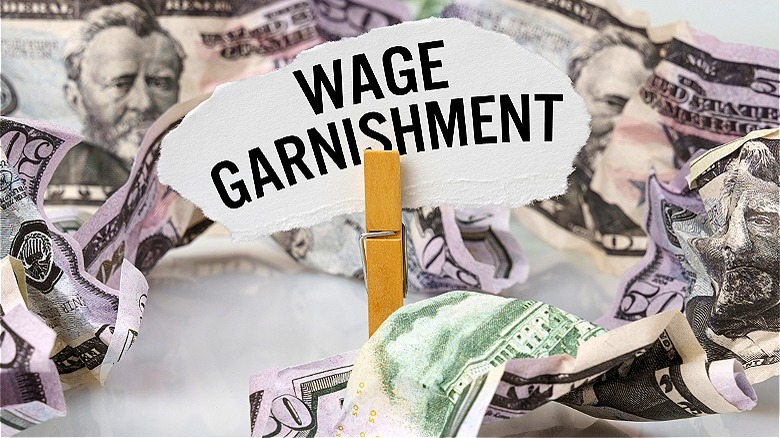5 Things A Debt Collector Is Legally Allowed To Do
While there is such a thing as good debt, if you've reached a point where a collection agency sends a debt collector after you, you aren't in that position. Collection agencies are incentivized to make your life difficult until you pay your debt since their commission is typically 25% to 50% of the debt you owe. The collection agency is a third-party operator to whom your debt has been sold, and according to Equifax, will inform you within five days of first contact that your debt has been transferred over to them with a debt validation letter.
There are a number of things debt collectors can't do, such as harrass you at work or at home with phone calls, or take you to court over ancient debts way past your state's statute of limitations. You can't be contacted before 8 a.m. or after 9 p.m., and while they can reach out to you discreetly over social media, they can't post your debt publicly on such a platform. If a debt collector contacts you for payment, you'll want to ensure the collection agency is licensed and verified through the NMLS, or nationwide multistate licensing system, before interacting with them. This will help protect you from fraud.
With all that said, now that you know what debt collectors can't do, it's a good idea to understand what they — legally — can do. Make no mistake, even with the limits placed on them, there are a few ways debt collectors can still make your life difficult.
1. Garnish your wages
We've already mentioned that a debt collector can't take you to court over a debt past the statute of limitations. However, if the debt is fairly recent or within the allotted time period for collection, your bank account, as well as wages, may be fair game with the permission of a court order obtained after a lawsuit. While there are limits on how much money can be taken from wages, these limits and/or exemptions vary by state. One national standard is that two months' worth of your federal benefits, including Social Security or veterans benefits, must be protected by your financial institution.
According to the U.S. Department of Labor, if you earn less than $217.50 per week, or $435 every two weeks, debt collectors can't garnish your wages. However, if you earn above that, you could be on the hook for a maximum of 25% of your wages. If the debt being collected is for alimony or child support in arrears, you could have as much as 50% of your wages collected from your employer or your bank account. If there's any benefit to finding yourself in this situation, it's that your employer can't terminate you over the garnishment of wages, which means you can continue paying off your debt and wipe the slate clean.
2. Sue you
According to data from The Pew Charitable Trusts, in 2021, 5% of U.S. adults dealing with debt collectors found themselves in civil court. The nonprofit notes that of the 16 states it reviewed for its study, in 13 of them, civil cases were the most common with regard to collections and debt. What's more, of these civil suits, 70% ended in default judgments in favor of the debt collector, typically because the defendant fails to show up in court to defend themselves. This tactic relies on you not showing up to dispute the claim after being served a notice of the lawsuit, which can result in the addition of the collection agency's legal fees and court costs to your debt.
Getting sued by a debt collector is a pain, and having to pay their legal fees in addition to your original debt isn't fun either. The Federal Trade Commission advises against ignoring legal letters sent to you for this reason, either through a lawyer or independently. Depending on the size of the debt owed, showing up to court with an attorney may be your best bet, as the onus is on the debt collector to prove you owe what they say you do — and that they've legally exhausted all other options before bringing your case to civil court. Note, if you can't afford a lawyer, legal aid can provide you with an attorney for a lower fee, or, the American Bar Association can offer you a directory of attorneys willing to represent you on a pro-bono basis.
3. Contact your family members
Debt collectors have been known to call family members in order to obtain information like your whereabouts or contact information. However, per federal law, debt collectors absolutely shouldn't be discussing your debt issues with any family members (this includes a partner or spouse, a legal guardian; or if dealing with a minor, a parent), nor should they be calling them more than once.
The Fair Debt Collection Practices Act protects you from this sort of embarrassing intimidation tactic, and a violation of this rule may have your debt collector ponying up $1,000 to you instead of the other way around. As per clause 805(c) of the act, you can demand in writing the debt collector end communication about the debt owed unless it's to inform you they're no longer pursuing the debt, are willing to enter into a payment arrangement, or that they're suing you.
There are certain allowances for a debt collector to contact your family and tell them about your debt. For instance, falling behind on child support, taxes, or homeowners association dues opens the door to debt-shaming in most states, which could mean your photo and/or name could be posted online, publicly, or to other members of your HOA.
4. Pursue a payment arrangement
The best way to avoid getting sued, going to court, or having your wages garnished is to pay off the debt. Aside from the constant stress weighing over you, bad credit affects you in more ways than you realize. For example, assuming you pass a credit check, future loans will come with higher interest rates, and if you need to move, a credit check revealing a litany of collection notices will turn most landlords off very quickly.
Once you have as much information about the nature of the debt, including how much is owed, the contact info of the debt collector, and the exact date the debt fell into arrears, you should budget for a payment schedule you can afford and attempt to negotiate with your creditors. A monthly payment schedule that considers your other financial responsibilities can free you of the debt while allowing you to keep from acquiring more.
If possible, negotiate a one-time reduced payment at 25% and up to 50% of what's owed to clear your delinquent account, and try to get the collection removed from your credit report to protect your credit score. It's important to note that debt collection companies don't owe you anything when it comes to collecting your debt, and aren't legally bound to accept any payment arrangement. Still, if they approach you with a payment offer, it's in your best interest to consider working with them to take care of the debt.
5. Sell your debt to another debt collector
Just because you manage to duck one collection agency long enough that it gives up trying to collect your debt, that doesn't mean it's the end of your debt story. That's because debt collectors can sell your debt to other creditors without needing your permission to do so. If that happens, it just means you've frustrated this particular collector to a point they don't see any value in pursuing your debt anymore. However, other collectors, specifically junk debt buyers, purchase old debt considered unrecoverable for a pittance and will do their best to squeeze profit out of you through all legal options available to them.
As the Consumer Financial Protection Bureau notes, while debt collectors can't sue consumers for debts past the statute of limitations, they can still try to collect on it. Letters, emails, and phone calls within legal restrictions are still allowed, and until this debt is paid, you'll either have to get used to the occasional check-in or just pay what you owe. What that means is that even if your debt is several years old and past the statute of limitations, a junk debt buyer can still come after you for what you owe through most of the aforementioned methods; they just can't sue you. Again, running from debt is a bad money habit that can crater your financial standing. If you need to ask a family member to borrow money, it's better to owe your family than a debt collector.





